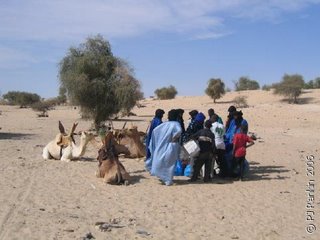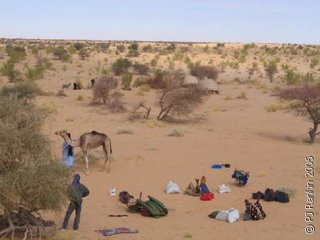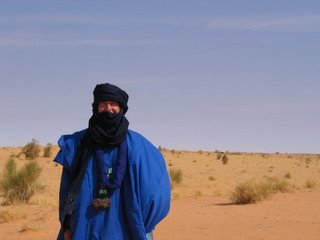Slowing down
The following morning sees an early start after the last chance for any proper wash for at least a week. 16-legged transport is already folded down on the sand behind the hotel Bouctou, surrounded by bags around which cluster the Tuaregs whom we will get to know well in the next few days: Mohamedune our guide and herder, young Mohamed our earnest interpreter, Al Hadana the cameleer clown and Omar who seems to have come along for the ride to Essakane. We'll be carrying quantities of the strong Chinese green tea and sugar (10kgs of sugar for each 1 kg of tea) that is the essence of Tuareg hospitality, as presents for the encampments we will visit on the way.
 OK, it's partly apprehension from previous prolonged and intimate encounters with the hard wooden saddles (a small cushion is a good idea to have in reserve for the soft Westerner), but this morning walking feels good exercise after the 4x4. So heading out westward, our party sets off. It's hardly a trek this time, more a 6 day stroll stopping to visit Tuareg encampments en route with only 70km to cover, which we would have done in 2 or 3 long days if we were back on the salt caravan trail. Well, it's not quite a stroll, as you need to walk 4 - 5 mph to keep up with the camels. Rapidly I remember to take a route over the hardest sand and shorten my stride where it's soft. The locals have a highly-developed, constant speed 'soft sandle shuffle' which minimizes slippage and wasted effort: their footprints are always cleaner than mine.
OK, it's partly apprehension from previous prolonged and intimate encounters with the hard wooden saddles (a small cushion is a good idea to have in reserve for the soft Westerner), but this morning walking feels good exercise after the 4x4. So heading out westward, our party sets off. It's hardly a trek this time, more a 6 day stroll stopping to visit Tuareg encampments en route with only 70km to cover, which we would have done in 2 or 3 long days if we were back on the salt caravan trail. Well, it's not quite a stroll, as you need to walk 4 - 5 mph to keep up with the camels. Rapidly I remember to take a route over the hardest sand and shorten my stride where it's soft. The locals have a highly-developed, constant speed 'soft sandle shuffle' which minimizes slippage and wasted effort: their footprints are always cleaner than mine.
 A few hours later and it's time for a lunch siesta in whatever tiny piece of shade that can be found in the heat of the day and for talking and snoozing. Saddles and bags are taken off the four camels, set free to wander off and graze. It's always seems a bit strange, the things are taken off the camels and left right there - one place in the desert is, after all, as good as any other. They've a saying, 'The camel has to eat but the thorns can blind its eye' - a nice way to put everything worthwhile carries a risk.
A few hours later and it's time for a lunch siesta in whatever tiny piece of shade that can be found in the heat of the day and for talking and snoozing. Saddles and bags are taken off the four camels, set free to wander off and graze. It's always seems a bit strange, the things are taken off the camels and left right there - one place in the desert is, after all, as good as any other. They've a saying, 'The camel has to eat but the thorns can blind its eye' - a nice way to put everything worthwhile carries a risk.
 Time too for the Tuareg tea ceremony: three cups of the sweet caffeine-jolts of strong Chinese green tea, lovingly made in the traditional small blue enamel teapot over a tiny charcoal brazier that's carried on the side of the saddle. Making tea is essential desert hospitality for Tuaregs to greet strangers or open any meetings. The tea-maker takes great care and pride in the whole process, sipping samples of the brew, pouring it back into the pot, until finally with a flourish he pours out the gold nectar from a great height into three tiny glass cups for the critical palates of those present. Cups are passed round on a silver platter in a strict order of seniority, to be taken in the right hand, drunk quickly and with suitably appreciative noise, then passed back for people waiting. Subsequent rounds are made later by adding even more sugar to the brew. The first round of tea 'as bitter as death' from the pot packed with tea leaves starts the exchange of pleasantries and news, whilst the second, 'as sweet as life' marks the opening of more serious matters and the final round 'as sugary as love' signals closure and time to depart.
Time too for the Tuareg tea ceremony: three cups of the sweet caffeine-jolts of strong Chinese green tea, lovingly made in the traditional small blue enamel teapot over a tiny charcoal brazier that's carried on the side of the saddle. Making tea is essential desert hospitality for Tuaregs to greet strangers or open any meetings. The tea-maker takes great care and pride in the whole process, sipping samples of the brew, pouring it back into the pot, until finally with a flourish he pours out the gold nectar from a great height into three tiny glass cups for the critical palates of those present. Cups are passed round on a silver platter in a strict order of seniority, to be taken in the right hand, drunk quickly and with suitably appreciative noise, then passed back for people waiting. Subsequent rounds are made later by adding even more sugar to the brew. The first round of tea 'as bitter as death' from the pot packed with tea leaves starts the exchange of pleasantries and news, whilst the second, 'as sweet as life' marks the opening of more serious matters and the final round 'as sugary as love' signals closure and time to depart.
 Whenever Tuaregs are sitting around talking, their hands seem to be continually sketching to mark and illustrate the conversation or just to doodle patterns and play in the pure fine, free-flowing sand.
Whenever Tuaregs are sitting around talking, their hands seem to be continually sketching to mark and illustrate the conversation or just to doodle patterns and play in the pure fine, free-flowing sand.
With all the new places and busy experiences of Burkina Faso, the first day of walking in the low dun-coloured dunes past occasional acacia thorn trees, I'm thinking I must be a bit crazy, there's nothing to do here! Later, as the days past the silence of the desert fills you. Your senses open up. You see, feel and hear the small things, slow down and get into the rhythm of desert travel on foot or rocking on camelback, enjoy the sunrises, sunsets and evening campfires and feel quiet inside, small in the landscape. Essakane feels like an interruption by the time we get there - you just want to keep on going towards the sunsets until you arrive in Mauritania.



0 Comments:
Post a Comment
<< Home